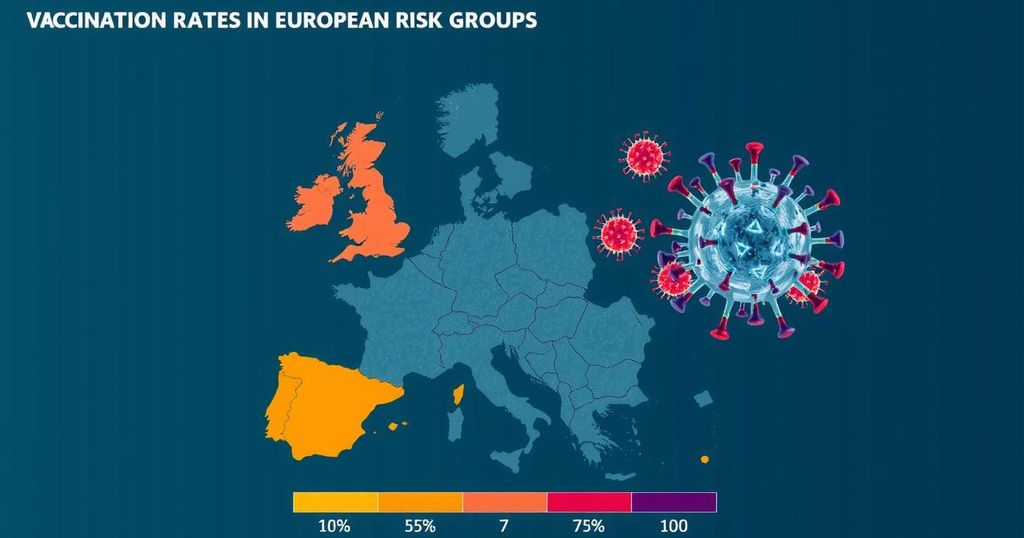Recent reports unveil low vaccine uptake against influenza and COVID-19 among Europe’s older adults for 2023-2024, with rates ranging from 12% to 78% for influenza, and 0.02% to 66.1% for COVID-19. Experts stress that diminished trust and data deficits hinder vaccination efforts, while Denmark showcases higher rates due to robust public trust. Strategies to enhance education, access, and transparency are crucial for improving vaccination rates among at-risk groups.
The latest reports from the European Centre for Disease Prevention and Control reveal disheartening trends regarding vaccine uptake among high-risk groups across Europe for the 2023 to 2024 period. Specifically, vaccination rates for influenza among older adults fluctuated starkly, with figures ranging from a mere 12% to a hopeful 78%. In comparison, the COVID-19 vaccination rates for those aged 60 and above presented an even more troubling picture, spanning from a paltry 0.02% to a more robust 66.1%. On average, only 14% of those in the targeted demographic received the vaccine, highlighting a stark contrast in public health efficacy. Alarmingly, only six nations could boast a vaccination coverage exceeding 50%, and none broke the 80% barrier. Máire Connolly, a professor of global health at the University of Galway, expressed her fears that these disappointing figures could herald an increase in the transmission of both COVID-19 and influenza, particularly in countries that might otherwise show high vaccination rates, like Ireland. The low uptake of vaccines raises crucial questions about public health strategies going forward. Echoing Connolly’s concerns, Anton Pottegård, another esteemed public health expert and professor at the University of Southern Denmark, emphasized that diminished trust in vaccines could paradoxically lead to greater infection rates, thereby inflicting additional stress on healthcare systems. He pointed out, “Decreased vaccine uptake will lead to more infections and therefore more strain on healthcare systems everywhere. But any short-term attempt to increase uptake risks damaging the long term. If we keep touting the benefits of vaccines without addressing concerns, we damage public trust.” Interestingly, Denmark stands out as a beacon of hope in vaccination efforts, with significant numbers of senior patients getting their influenza and COVID-19 shots—78% of those aged 65 and older for flu, surging to 88.6% among elders aged 80 and over for COVID-19. Pottegård attributes this success to a robust foundation of public trust, nourished by transparency from health officials about both the advantages and possible complications of vaccination. In stark contrast, Germany has faced issues concerning its data collection regarding vaccination rates. As Oliver A. Cornely of the University of Cologne points out, the country missed crucial statistics for 2023-2024, although it previously reported a 43% vaccination rate among older adults for flu during the 2021-2022 season. Such disparities underline the importance of reliable data for the formulation of effective public health messaging. Antoine Flahault of the University of Geneva further illustrates the unpredictability of vaccine effectiveness, particularly in relation to booster doses, which are currently sanctioned on scant evidence—managing health risks on shaky foundations. The World Health Organization (WHO)/Europe representative contended that thorough investigations into the reasons behind reluctance in key demographics must take precedence. Structural, logistical, and economic hurdles, along with a general lack of awareness, necessitate targeted approaches such as streamlined access to vaccination services and education about vaccine benefits to reverse these trends and bolster public health safety.
In recent years, Europe has witnessed fluctuating vaccination rates for seasonal influenza and COVID-19, particularly within key risk groups such as the elderly. Public health officials have expressed concerns over low uptake rates, suggesting they may enhance the susceptibility of vulnerable populations to these diseases. Disparities across the European Union and European Economic Area have become apparent, raising alarms about potential repercussions for public health systems. The understanding of vaccine efficacy, historical hesitancy, public trust, and access to reliable health data serve as critical underpinnings for shaping the future of vaccination campaigns.
As Europe confronts the ramifications of inadequate vaccine uptake, understanding public sentiment and improving communication strategies emerges as paramount. Countries like Denmark exemplify how trust bolsters vaccination efforts, while others demonstrate the disarray that arises from poor data and public engagement. Prioritizing transparency, accessibility, and targeted education is essential to navigate the complexities of public health and elevate vaccination rates among at-risk populations.
Original Source: www.medscape.com

Leave a Reply